Aristophanes
FrogsAristophanes
Frogs Translated with
Introduction and Notes Jeffrey HendersonBoston University Frogs 2008 Jeffrey Henderson
Frogs 2008 Jeffrey Henderson
Focus Publishing/R. Pullins Company PO Box 369 Newburyport, MA 01950 www.pullins.com ISBN: 978-1-58510-682-0 Also available in paperback (ISBN 978-1-58510-308-9). To see all available eBook versions, visit www.pullins.com. Some content that appears in the print edition may not be available in other formats. All rights are reserved. No part of this publication may be reproduced, stored in a retrieval system, or transmitted in any form or by any means, electronic, mechanical, by photocopying, recording, or by any other means, without the prior written permission of the publisher.
If you have received this material as an examination copy free of charge, Focus Publishing/R. Pullins Company retains the title to the information and it may not be resold. Resale of any examination copies of Focus Publishing/R. Pullins Company materials is strictly prohibited. Last updated January 2013 Aristophanes of Athens, the earliest comic playwright from whom whole works survive, was judged in antiquity to be the foremost poet of Old Attic Comedy, a theatrical genre of which he was one of the last practitioners and of which his eleven surviving plays are our only complete examples. His plays are valued principally for the exuberance of their wit and fantasy, for the purity and elegance of their language, and for the light they throw on the domestic and political life of Athens in an important era of its history.
Legend has it that when the Syracusan tyrant Dionysius wanted to inform himself about the republic of the Athenians, Plato sent him the plays of Aristophanes. Little is known about Aristophanes life apart from his theatrical career. He was born ca. 447/6, the son of one Philippus of the urban deme Cydathenaeum and the tribe Pandionis, and he died probably between 386 and 380. By his twenties his hair had thinned or receded enough that his rivals could call him bald. He seems to have had land-holdings on, or some other connection with, the island of Aegina, a connection that detractors and enemies exploited early in his career in an attempt to call his Athenian citizenship into question.
In the 420s he was twice prosecuted by a fellow demesman, the popular politician Cleon, for the political impropriety of two of his plays (Babylonians of 426 and Knights of 424), but neither time was he convicted. Early in the fourth century he represented his tribe in the prestigious government position of Councillor. Four comic poets of the fourth century, Araros, Philetaerus, Philippus and Nicostratus, are reputed in ancient sources to be his sons. In his dialogue Symposium Plato chose Aristophanes to represent comedy, a sign that soon after his death Aristophanes was already regarded as the genres preeminent practitioner. Plato portrays him as being at home among the social and intellectual elite of Athens. Although the historical truth of Platos portrayal is uncertain, subsequent tradition agreed about Aristophanes professional and literary stature, and Aristophanes plays do generally espouse the social, moral and political sentiments of contemporary upper-class conservatives: nostalgia for the good old days of the early democracy, which defeated the Persians and built the empire; dismay at the decadence, corruption and political divisiveness of his own day; hostility toward the new breed of populist leaders who emerged after the death of the aristocratic Pericles in 429; impatience with the leadership and slow progress of the Peloponnesian War (431-404), particularly when it threatened the interests of the landowning classes; and unhappiness about many of the artistic and intellectual trends of his own day, especially those he regarded as harming the high art of drama.
There is no question that Aristophanes comic expression of such views reflected, and to a degree shaped, community opinion, and that comedy could occasionally have a distinct social and political impact. But the fact that Aristophanes emerged politically and artistically unscathed from the war, from two oligarchic revolutions (411 and 404), and from two democratic restorations (411 and 403) suggests that on the whole his role in Athenian politics was more satirical, moral(istic) and poetical than practical; and the perennial popularity of his plays would seem to indicate that the sentiments they express were broadly shared at least among the theatrical public. The period of Old Comedy at Athens began in 486 BC, when comedy first became part of the festival of the Greater Dionysia; by convention it ended in 388 BC, when Aristophanes produced his last play. During this period some 600 comedies were produced. We know the titles of some fifty comic poets and the titles of some 300 plays. We have eleven complete plays by Aristophanes, the first one (Acharnians) dating from 425, and several thousand fragments of other plays by Aristophanes and other poets, most of them only a line or so long and very few deriving from plays written before 440.
The principal occasions for the production of comedies were the Greater Dionysia, held in late March or early April, and (from 440) the Lenaea, held in late January or early February. These were national festivals honoring the wine-god Dionysus, whose cult from very early times had included mimetic features. The theatrical productions that were the highlight of the festivals were competitions in which poets, dancers, actors, producers and musicians competed for prizes that were awarded by judges at the close of the festival. The Greater Dionysia was held in the Theater of Dionysus on the south slope of the Acropolis, which in the fifth century accommodated as many as 10,000 spectators, including both Athenian and foreign visitors, and by the fourth century as many as 17,000. The Lenaea, which only Athenians attended, was held elsewhere in the city (we do not know where). By the fourth century the Lenaea was held in the Theater of Dionysus also, but it is unclear when the relocation occurred.
At these festivals comedy shared the theater with tragedy and satyr-drama, genres that had been produced at the Greater Dionysia since the sixth century. The first city contest in tragedy is dated to 534, when the victorious actor-poet was Thespis (from whose name actors are still called thespians). But it is not certain that Thespis contest was held at the Greater Dionysia, and in any case this festival seems to have experienced major changes after the overthrow of the tyranny and the establishment of democracy, that is, after the reforms of Cleisthenes in 508. Tragedy dramatized stories from heroic myth, emphasizing dire personal and social events that had befallen hero(in)es and their families in the distant past, and mostly in places other than Athens. By convention, the poetry and music of tragedy were highly stylized and archaic. Satyr-drama, which was composed by the same poets who wrote tragedy, had similar conventions, except that the heroic stories were treated in a humorous fashion and the chorus was composed of satyrs: mischievous followers of Dionysus who were part human and part animal.
Comedy, by contrast, had different conventions of performance (see on Production, below) and was less restricted by conventions of language, music and subject. That is probably why the composers and performers of tragedy and satyr-drama were never the same ones who composed and performed comedy. The language of comedy was basically colloquial, though it often parodies the conventions of other (particularly tragic) poetry, and was free to include indecent, even obscene material. The music and dancing, too, tended to reflect popular styles. The favorite subjects of comedy were free-form mythological burlesque; domestic situations featuring everyday character types; and political satire portraying people and events of current interest in the public life of the Athenians. Our eleven surviving comedies all fall into this last category.
Next page
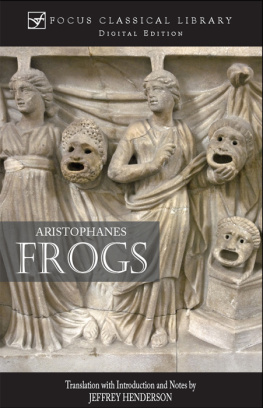

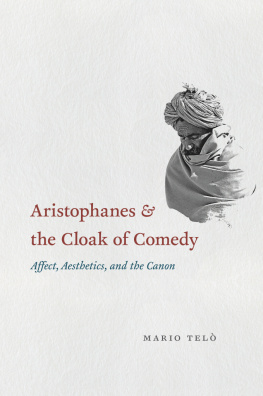
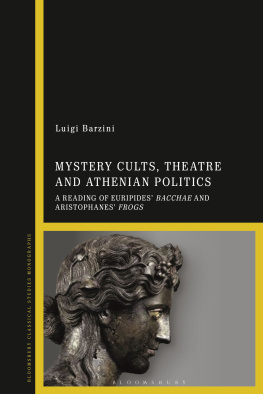
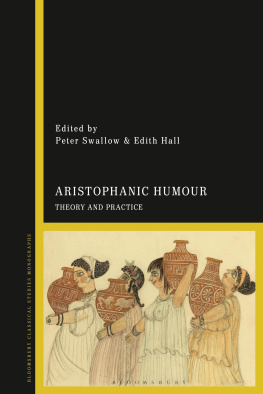

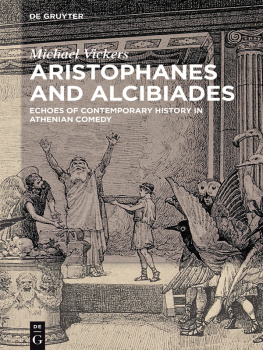
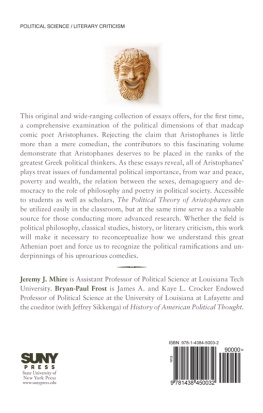
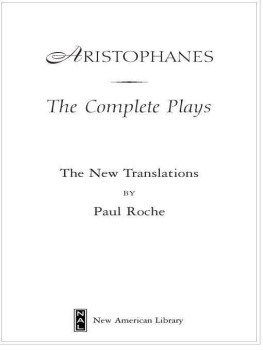
 Frogs 2008 Jeffrey Henderson
Frogs 2008 Jeffrey Henderson